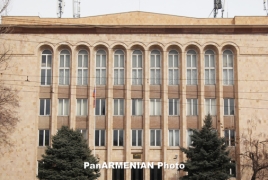
During a discussion at the Media Center, lawyer Harutyun Harutyunyan criticized the Constitutional Court’s recent decision regarding the constitutionality of the law On Confiscation of Property of Illicit Origin.
He stated that the Prosecutor’s Office is attempting to apply the Court’s reasoning selectively, especially its contradictory concluding interpretation.
He emphasized that in criminal law, where the goal is to combat crime, a direct link must be established between the confiscated property and the specific crime in question, Aravot.am reports.
“When the law says ‘in connection with a crime,’ it refers to a relevant crime. As legal professionals, we interpret this to mean the specific alleged crime under criminal investigation,” Harutyunyan said.
He asserted that the actions and interpretations of law enforcement bodies contradict the ruling’s final section, indicating a deliberate misalignment of logic.
“In my view, since the presiding judge was about to travel to the European Court, and signals were received to resolve the issue beforehand, the court session was hastily scheduled and the decision published quickly. This ruling was written in just a few days, despite taking 3–4 years to reach publication. This is unprecedented—I can’t recall such a case from the Constitutional Court,” he stated.
Harutyunyan added that for cases based on intelligence-gathered data, authorities must refrain from pursuing confiscation related to the period before the suspect assumed public office.
“In all cases where lawsuits are based on intelligence operations, the state should drop claims involving property acquisition predating the official’s term,” he said.
While some legal opinions stress the moment the crime occurred, Harutyunyan disagreed: “I don’t share that view. From the time the crime is committed, proceedings can begin regardless of when the person assumed office. But we must deal with the current legal framework.”
He noted that before the establishment of the Anti-Corruption Court in 2020–2021, some cases saw no court rulings at all.
“Experience shows that due to banking transaction data gathered by law enforcement—information now deemed irrelevant under the Constitutional Court’s ruling—public resources were wasted,” he added.
Harutyunyan concluded that continuing to misinterpret the ruling could again lead to inefficient spending and legal liability.
“If the current unconstitutional interpretation persists, the state will inevitably face consequences—potentially involving specific officials who, after reviewing the facts, may attempt to manipulate the legal tools to justify their aims,” he warned.

